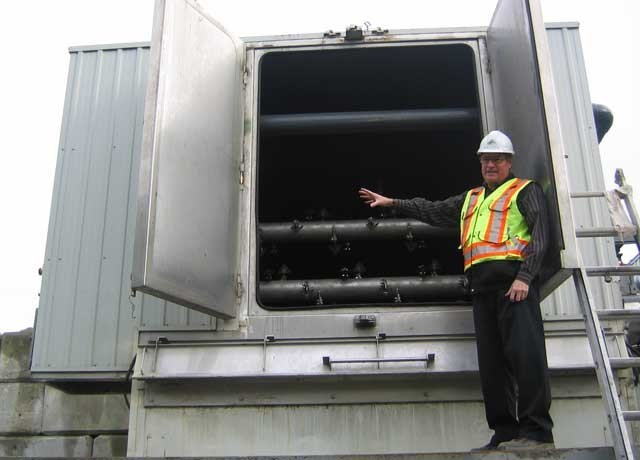In the two and a half weeks since opening its doors to the public, Whistler’s compost facility has been busy.
About 300 tonnes of vegetables, food scraps, yard trimmings and other organic waste have been pumped through the facility’s tunnels since Dec. 8. And the first batch of fertilizer was finished this week and is ready for curing.
“It has been a very smooth start up, and there have been no difficult problems,” said Brian Barnett, general manager for environmental services at the Resort Municipality of Whistler.
“There have been a few little problems, partly associated with the cold weather, but nothing serious.”
Whistler-Blackcomb is among the list of businesses signing up to get its organic waste trucked to the $13.7 million facility in the Callaghan.
“They (Whistler-Blackcomb) are actually bringing it down the mountain on snowcats every night, which for them is quite an operation,” said Colin Pitt-Taylor, composting coordinator.
Pitt-Taylor added that Whistler-Blackcomb has also changed its buying practices to reduce its garbage by 10 per cent.
“They no longer have cardboard Coke cups, and they no longer have coffee cups,” said Pitt-Taylor.
“They have ceramic coffee cups, and they have real glasses from Coca-Cola. They also have bulk ketchup, bulk mustard, and real plates, knives and forks.”
So far, 14 restaurants have also signed-up for compost pick up. And Pitt-Taylor suspects 95 per cent of Whistler restaurants will be on board by the end of the winter season.
“There is hardly anybody that is not keen to do it,” he said.
“Once we explain how it works — that it goes to the Callaghan and gets composted and turned into soil that they can buy back in the spring and put in their grass — it is almost like ‘Oh, yeah, of course we want to do that.’”
Whistler residents are also taking advantage of the two compost drop-off bins located at the Nesters and Function Junction garbage and recycling depots.
According to Barnett, the bins fill up a couple times a week.
“We weren’t really sure what to expect, so we are pretty pleased with that,” he said.
The RMOW built the compost facility to reduce the amount of garbage heading down to the Rabanco Landfill in Washington state. Eventually the municipality hopes to make Whistler a “zero waste” community.
The composting is done through a natural microbial process. Carbon, nitrogen, oxygen and water are mixed together with bacteria to turn decaying waste into nutrient-rich soil.
It takes 14 days from the time the waste enters the tunnels to when it is ready for curing, and the tunnels must be fed daily to keep the biological process in-line.




